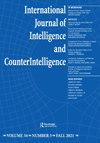Looking Back at the Gouzenko Defection
IF 0.5
Q4 INTERNATIONAL RELATIONS
International Journal of Intelligence and Counterintelligence
Pub Date : 2023-04-03
DOI:10.1080/08850607.2022.2080982
引用次数: 0
Abstract
Abstract A historical perspective aids our understanding of the present and capacity to anticipate the future. Russia’s invasion of Ukraine in 2022, but particularly its brutality and policy of “constructive destruction,” was shocking and unexpected, but faced with Russia’s relegation from superpower status, it was always a possibility that Putin would emulate Stalin’s determination to maintain Russian influence in the world and challenge the West’s dominance. The risk of recurrent totalitarianism borne of the fear, distrust, and mutual demonization which characterized the ideological rivalry of the early Cold War years has led to a search for historical analogies of relevance to the growing East/West tensions of today that threaten to bring about a second Cold War or limited nuclear conflict. The motivating ideology for Russian expansionism is no longer Communism, but a mythical narrative that promotes Russian nationalism, patriotism, and exceptionalism. Putin’s authoritarian state with its concentration of power and recourse to propaganda, disinformation, and lies is daily looking more Stalinesque and the Cold War question—how to contain Russian ambition—remains to be answered. While the focus has so far been on Stalin’s geopolitical strategy regarding Russia’s near neighbors, two books about the first post–World War II defection in 1945 merit re-visiting for the in-depth analysis and insights they provide into the period and the mindset of participants caught up in that affair. The defector, Igor Gouzenko, a Russian cyber clerk, insisted that Russia was preparing for a Third World War. His revelations precipitated the start of the Cold War.回顾古琴科叛逃事件
历史观点有助于我们理解现在和预测未来的能力。俄罗斯在2022年入侵乌克兰,尤其是其暴行和“建设性破坏”政策令人震惊和意外,但面对俄罗斯从超级大国地位上的下降,普京总是有可能效仿斯大林的决心,保持俄罗斯在世界上的影响力,挑战西方的主导地位。恐惧、不信任和相互妖魔化是冷战早期意识形态对抗的特征,极权主义复发的风险导致人们开始寻找与今天日益增长的东西方紧张关系相关的历史类比,这种紧张关系可能会带来第二次冷战或有限的核冲突。推动俄罗斯扩张主义的意识形态不再是共产主义,而是一种促进俄罗斯民族主义、爱国主义和例外论的神话叙事。普京的集权国家依靠宣传、虚假信息和谎言,越来越像斯大林,而冷战时期的问题——如何遏制俄罗斯的野心——仍有待回答。虽然到目前为止,人们关注的是斯大林对俄罗斯邻国的地缘政治战略,但有两本关于1945年第二次世界大战后的第一次叛逃的书值得重新审视,因为它们对那个时期和卷入该事件的参与者的心态进行了深入的分析和洞察。叛逃者Igor Gouzenko是一名俄罗斯网络职员,他坚持认为俄罗斯正在为第三次世界大战做准备。他的揭露加速了冷战的开始。
本文章由计算机程序翻译,如有差异,请以英文原文为准。
求助全文
约1分钟内获得全文
求助全文
来源期刊

International Journal of Intelligence and Counterintelligence
INTERNATIONAL RELATIONS-
CiteScore
1.00
自引率
22.20%
发文量
102
 求助内容:
求助内容: 应助结果提醒方式:
应助结果提醒方式:


